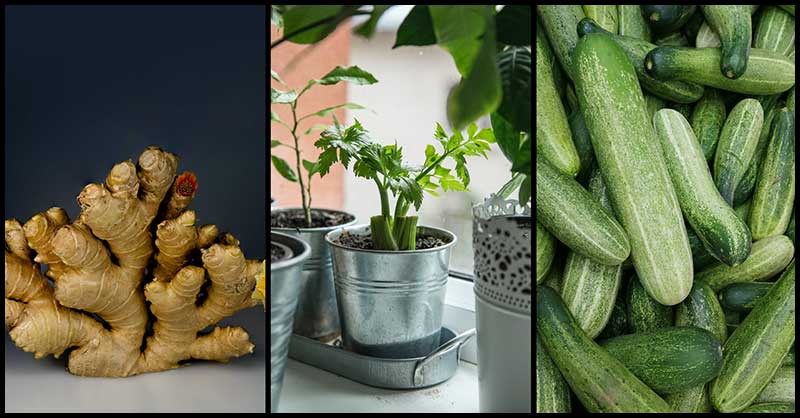Poor lifestyle choices are one of the reasons behind uric acid crystal formation. If not treated early, this can lead to a painful condition known as gout, a form of arthritis caused by excess uric acid in the bloodstream.
There are certain foods that may help us in lowering down the uric acid levels in our body, help eliminate toxins that cause uric acid overload, and reduce inflammation of the joints (1).
Ginger Root
This versatile and well-known herb has anti-inflammatory properties and can be used as one of the many different treatments for gout relief (2). It can help reduce inflammation, swelling, as well as lower the blood uric acid levels and confer respite to gout attacks (3).
In a study, results showed that topical ginger reduced pain related to uric acid in gout (4). In addition to this, another study revealed that ginger helped lower the serum uric acid level in patients with high levels of uric acid (hyperuricemia) (5).
Celery
Celery contains luteolin, 3-n-butylphthalide (3nB), and beta-selinene which have been researched for their role in inflammation and uric acid production, a driving force behind the severity of gout attacks (6).
Luteolin is a flavonoid. In a study, researchers investigated its impact on nitric oxide produced from uric acid. Though nitric acid is important in our body, large amounts of it can produce oxidative stress and inflammation. Results of this study suggest that luteolin reduced the production of nitric oxide from uric acid and may provide some protection from uric acid-induced inflammation in gout (7).
Meanwhile, beta-selinene was found to contain a wide variety of antioxidant and anti-inflammatory properties (8).
Research showed that 3-n-butylphthalide (3nB) may help reduce both oxidative stress and pro-inflammatory pathways. These results indicate that celery may help reduce gout-related inflammation (9).
Celery juice, celery stalks, and celery seeds can be incorporated into our diet to reduce the severity or frequency of gout attacks.
Cucumbers
Cucumbers are packed with nutrients that are needed by our body. It helps keep the body hydrated and eliminates toxins. It’s rich in A, B6, B1, C & D, calcium, folate, potassium, and magnesium as well as silica which known to help in promoting joint health by strengthening the connective tissues.
Moreover, cucumbers are very low in purines, containing only 7.3 milligrams of purines in every 100 grams of the vegetable. It is ideal for a low-purine, gout-preventing diet. Also, due to its high amount of water content (over 95 percent of cucumber’s weight), it can help flush uric acid from our body thus preventing the buildup of uric acid that creates gout symptoms (10).
References:
- https://www.1mhealthtips.com/how-to-naturally-remove-uric-acid-crystals-in-your-joints/
- https://www.thehealthy.com/arthritis/gout-natural-remedies/
- https://www.netmeds.com/health-library/post/gout-5-incredible-foods-to-ease-joint-pain-and-swelling
- http://www.ijstr.org/final-print/oct2017/Effect-Of-Red-Ginger-Compress-To-Decrease-Scale-Of-Pain-Gout-Arthiris-Patients.pdf
- https://www.express.co.uk/life-style/health/1347186/gout-symptoms-what-is-treatment-diet-ginger
- https://www.healthline.com/health/gout/can-different-parts-of-the-celery-plant-naturally-treat-gout#how-it-works
- https://www.ncbi.nlm.nih.gov/pmc/articles/PMC4102843/
- https://www.ncbi.nlm.nih.gov/pmc/articles/PMC5622387/
- https://www.ncbi.nlm.nih.gov/pmc/articles/PMC5609149/
- https://www.livestrong.com/article/489937-cucumbers-for-gout/









